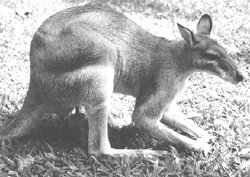Kangaroos in jeopardy
 the mad cow disease and the dioxin scare in Europe has spelt doom for kangaroos in Australia. The animal has increasingly come under threat in the wake of export of large quantities of kangaroo meat to Europe in recent weeks.
the mad cow disease and the dioxin scare in Europe has spelt doom for kangaroos in Australia. The animal has increasingly come under threat in the wake of export of large quantities of kangaroo meat to Europe in recent weeks.
"Kangaroo meat is ideally suited for barbecue and char-grill, and its low fat, low cholesterol content makes diet-conscious people relish it,' Michael Mulligan, the owner of Southern Game Meat, Sydney, told Down To Earth (dte) .
If chickens and pork are also contaminated with dioxin, more Australians will turn to kangaroo meat, he added. It was believed that the export of kangaroo meat was a short-term measure taken in the wake of diseases targeting traditional meat sources like chicken and beef, said Michael Zampogna, president, Animal Liberation in Western Australia. Hebelieved that Europeans would switchback to beef once the mad cow fears had vanished and prices came down. That unfortunately has not happened.
Kangaroo meat export has been growing steadily. Jim Harwood, director Overseas Game Meat Export, Queensland, the second largest exporter of kangaroo meat told dte : "Our sales have doubled in the last two weeks. We have about 100 employees and they have been working overtime.'
One issue that worries conservationists is that a large number of kangaroos have been affected by a disease which makes them blind. "We do not know the reason or whether it could be passed on to other animals or humans,' says Zampogna.
Another issue is that of the kangaroo population. He said no accurate survey of the number of kangaroos in Australia could be made because all surveys are done by air. Mike Norris, a government official said there is a government quota for culling of kangaroos every year. The quota is set depending on whether kangaroo numbers are increasing and whether they are female or ageing.
Meanwhile, environmental pressure group Greenpeace has called on the Australian government to establish national standards to eliminate dioxin pollution in the wake of the food contamination scare in Europe. Darrel Luscombe who has worked for Greenpeace told dte that in December 1998, Greenpeace released a study of the sources of dioxin pollution in Australia.
The report identified 20 dioxin pollution hotspots across Australia and a large number of unregulated potential sources. He said the dioxin scare in Europe has led to an increasing demand for alternative meat sources.
